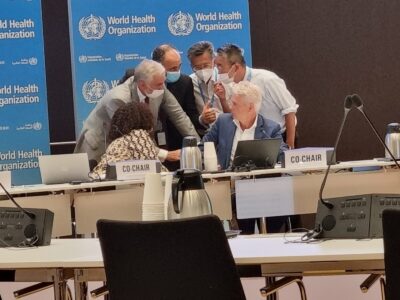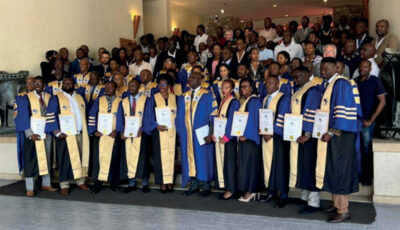Main content
In this section, we would like to introduce you to colleagues in global health and tropical medicine. They can include those who already have considerable experience and are looking back at their career or those in a much earlier stage of their professional life – basically anyone who has a story to tell.
In this issue, we had the pleasure to interview Albertine Baauw and Barend Gerretsen, the current and previous head of the training institute for physicians in Global Health and Tropical Medicine (PGHTM) respectively. They shared with us their personal experiences, their views on the role of the PGHTM, and some advice for Global Health professionals.
Personal sketch
Barend: “I studied medicine at the VU, where I was one of the first to be able to do a research internship abroad. I had the option of going to either Indonesia or Bangladesh and chose the latter, a choice which, looking back, has had quite an impact on my life. I have developed a weakness for Bangladesh and have been back many times. I was happy I got to work together with a local organisation, a so-called grassroot organisation. This inspired me to continue my career in international healthcare, and I decided to follow the tropical doctor training, together with Albertine.
After the Netherlands Course in Global Health and Tropical Medicine (NTC), I went to Zambia for a couple of months and after that briefly to Mozambique. Eventually, I went to St. Francis Hospital in Turiani, Tanzania, which was quite exciting since my predecessors were well-known tropical doctors. Unfortunately, the collaboration between the hospital and Cordaid Memisa stopped, which highlighted the problems with the sustainability of the hospital and the program that had been set up.
I eventually ended up in public health, working as an educator for KIT (Koninklijk Instituut voor de Tropen, Royal Tropical Institute), as team lead Health Systems Strengthening, and of course as head of the training in Global Health and Tropical Medicine (GH&TM), which I did for seven years. Right now I am on the supervisory board of Amref, a very different role that I enjoy a lot. Due to all my previous experiences, I have a helicopter view of the workings of such an organisation.”
Albertine: “I would like to describe my career by means of all the different roles you can have as a PGHTM. My first experience was in Sri Lanka, in gynaecology and obstetrics, where I worked for Doctors without Borders in a big team on the frontline. My role was an Emergency Aid physician, which I think is a function that a PGHTM is suitable and prepared for, since they can fulfil many different roles in a big team, which is needed in case of war or natural disasters. Another role I had was in Public Health and as a Clinician when I worked in Malawi for Cordaid. I was a medical officer but also a public health supervisor. This combination of work is what a PGHTM is trained for. You simultaneously work in the villages with prevention programs and as clinician in the hospital, both of which reinforce one another. As PGHTM, you are trained to be more aware of the social determinants of health and that benefits individual patient care as well.
Another role was in Advocacy, as a paediatrician for refugee children in the Netherlands, where I had to think from many perspectives. Communicator is an important role since you learn to ‘speak the language of many’ when you have worked in different settings and locations, and you learn to recognize the patterns that are similar overall. As an Educator you have to adjust to the group you work with. In the Netherlands, I would follow a training with only paediatricians, but as PGHTM you learn to involve the whole team in a training. For example, in a LMIC we would teach ETAT (Emergency Triage Assessment and Treatment) to the whole team, including the night watchman, since he will have to alert the doctor if necessary. And there are many more roles a PGHTM can have. Barend, do you have some additions?” Barend: “Initiator!” Albertine: “Yes, as head of the training institute for PGHTM, I love to work with this group of people since they are so energetically devoted as doers starting initiatives. They are able to identify problems and work to solve them. For instance, they look for ways to implement PGHTM in the care for refugees from the Ukraine war, and to connect the public health sector with the curative health care in this setting.”
Your contribution to LMICs
Barend: “First of all, the individual patients: being able to save them is quite rewarding although a bit of old-fashioned tropical doctor sentiment. I realized the impact as a doctor in a hospital is quite limited, so this motivated me to do a master’s in health systems management and continue my career in Public Health. In my seven years as head of the training institute for PGHTM, I did my best to promote the program since I believe that doctors who are going to work in an LMIC need proper preparation. I think it is unethical to go abroad and work in an unknown setting, unprepared, leading to unsafe situations. Of course, the program still has its shortcomings, but it does teach doctors what not to do in those situations as well.”
What insights have you gained that are useful for the Dutch healthcare system?
Barend: “I promoted the GH&TM program because I am convinced it has added value for healthcare in the Netherlands as well as abroad. The PGHTM works in the service of both the Dutch and international healthcare using a lot of skills gained abroad, including intercultural communication. A very obvious role for them is of course during a pandemic, when healthcare problems are not confined within borders and you need doctors with outbreak experience.
We try to develop all those other roles that Albertine mentioned in PGHTM as well, roles that they bring back to the Netherlands with them. What we must keep in mind is that we cannot quantify the added value of a PGHTM for the Dutch healthcare. We must focus on the fact that experience abroad expands your personal skills, knowledge and other competencies which are of value for the Dutch healthcare system.”
Albertine: “The NTC has made quite an impact on me, because you focus more on Health Systems and projects. In the course, you have the health resource allocation game, where you construct a health system and see what the impact is on the individual health care. Actually, during the whole GH&TM training, you learn to look at many different perspectives, and implement them in individual health care, which is also of high importance in Dutch healthcare.”
Future of the physician global health and tropical medicine
Barend: “Nowadays, we are focusing more and more on other non-clinical competencies such as intercultural communication during the internship abroad. This competency, in particular, is quite a challenge for PGHTMs in training as they start with a lot of clinical work.
I must admit that it remains a challenge to shape the training in the current teaching culture and that we need some goodwill to be able to continue. We have achieved a lot over the years but are in a vulnerable position since we do not receive structural funds. However, I do believe that the training is in a stronger position than before, and I see a bright future for it.”
Albertine: “As mentioned before, PGHTMs are very well trained to identify and solve problems that are broader than only one specific interest. For example, right now we are discussing with a PGHTM how this group in the Netherlands can step in to help with the Ukrainian refugees. This crisis also highlights that it is unclear who is responsible in this context. Is it the municipal health services? I believe the PGHTM can act as a bridge between public health and curative health, something that is still lacking in the Netherlands. Additionally, the advocacy role will also become a more important role for the PGHTM abroad and in the Netherlands. Finally, globalisation and global developments demand that we adjust the GH&TM training to the needs abroad and in the Netherlands.”
Advice for young professionals in global health:
“ALWAYS STAY MODEST AND CURIOUS”
“DO NOT THINK YOU ARE GOING TO CHANGE AND IMPROVE EVERYTHING; SMALL STEPS ARE ENOUGH”
“LEARN AS MUCH FROM OTHER CULTURES AND TAKE THIS WITH YOU ABROAD AND BACK TO THE NETHERLANDS”



















































